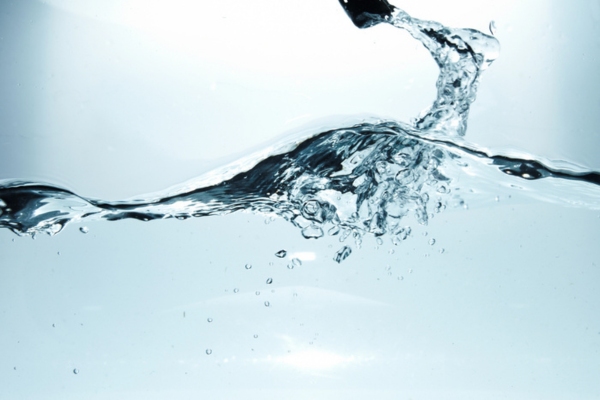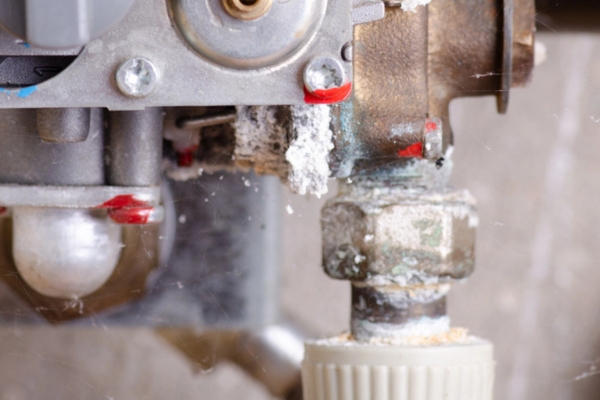Contents
- Basics of Boiler Operations
- How Water Quality Affects Boiler Efficiency
- Water Treatment Solutions for Boilers
- Continuous Monitoring and Automated Boiler Control Systems
- Boiler Efficiency & System Water Quality FAQs
- What Does “Boiler Efficiency” Mean?
- How Can I Identify if Poor Water Quality is Impacting My Boiler’s Efficiency?
- Is It Safe to Use Regular Tap Water in Boilers?
- How Frequently Should Water Quality Be Monitored in Boiler Systems?
- What Are the Long-Term Consequences of Ignoring Water Quality in a Boiler System?
- Conclusion
- Reach Out To Taylor Energy For All Your HVAC Needs
Ensuring that your home’s boiler operates efficiently is essential. Boiler efficiency in transforming fuel into heat can lead to decreased utility bills and a reduced environmental impact. However, this performance is heavily dependent on the quality of water used.
Contaminants such as minerals, gases, and organic materials in water can lead to problems like scaling, corrosion, and foaming, all of which diminish the boiler’s function. Consequently, a thorough grasp of water quality management is indispensable for maintaining peak boiler efficiency. This article by Taylor Energy discusses the impact of water quality on boiler efficiency.
Basics of Boiler Operations
Explore the fundamental principles that govern how your boiler functions and impacts your home.
The Role of Water in Boiler Systems

Water is indispensable in boiler systems. It is the medium that transfers heat generated from fuel combustion for heating and industrial applications. Water is brought to a boil in steam boilers, converting it into steam for multiple purposes across various settings.
Experience top-tier HVAC services with Taylor Energy and enjoy lower energy bills and improved comfort in your home. Call us now!
Critical Components of a Boiler System
A boiler system consists of critical components crucial for its functionality. The burner initiates combustion in the chamber, turning fuel into heat. This heat is subsequently passed to water through the heat exchanger. The system also has various controls and safety mechanisms that ensure efficient and secure operations. Additionally, the flue stack expels by-products of combustion. Each component is vital in maintaining the system’s efficiency and overall performance.
How Water Quality Affects Boiler Efficiency
Discover how water quality influences the operational efficiency and lifespan of boiler systems.
Overview of Impurities Commonly Found in Heating System Water

The water in boiler systems often harbors a range of impurities that can negatively impact their efficiency. These contaminants include:
- Minerals: Primarily calcium and magnesium, they are typically found in hard water.
- Gases: Gases like carbon dioxide and oxygen can enter the system.
- Organic Matter: These originate from multiple external and internal sources.
- Suspended Solids: They are derived from internal system breakdowns and external sources.
Scale Formation and Its Impact
Scale formation poses a significant challenge in boiler systems, stemming from accumulating minerals such as calcium and magnesium. This issue manifests through:
- Formation of Scale: Minerals precipitate, settle, and solidify on boiler surfaces.
- Reduced Heat Transfer: Scale is an insulator, significantly reducing heat transfer efficiency.
- Potential for Tube Failures: Ongoing scale buildup can cause tube blockages, leading to possible damages.
Upgrade your HVAC system with Taylor Energy and benefit from expert installations and cost-effective solutions. Schedule your consultation today.
HVAC Corrosion and Its Detrimental Effects
Corrosion is a critical concern in boiler systems, triggered by factors like oxygen ingress and pH imbalances in the water. This process can degrade boiler components, posing risks to both efficiency and safety. The deterioration caused by corrosion compromises the system’s performance and emphasizes the necessity for swift and effective management of these issues to maintain optimal efficiency.
Foaming, Priming, and Carryover
Certain less common but significant issues arise from high concentrations of impurities in the boiler water, adversely impacting efficiency. These issues typically lead to degraded steam quality, diminishing the system’s performance. Moreover, conditions such as foaming and carryover can damage downstream equipment, necessitating additional maintenance and posing operational challenges.
Water Treatment Solutions for Boilers
Explore practical strategies to enhance water quality and boost your boiler’s performance and longevity.
Boiler Water Pre-treatment Options
Implementing effective water treatment is vital to optimizing boiler efficiency, with pre-treatment options being crucial components. These methods include:
- Filtration Systems: These are tailored to eradicate particulate matter and suspended solids from the water.
- Softeners and Ion Exchange: These remove minerals like magnesium and calcium to lessen water hardness.
- Deaeration and Oxygen Scavengers: These techniques are designed to remove dissolved gases, especially oxygen, which can lead to corrosion.
- pH Adjusters and Alkalinity Builders: These regulate pH and alkalinity levels, helping prevent corrosion and scale formation.
Internal Boiler Water Treatment Methods
Internal treatment methods safeguard boiler systems from efficiency losses and structural damage. Key strategies include:
- Boiler Scale Inhibitors: These chemicals prevent scale buildup on boiler surfaces.
- Corrosion Inhibitors: These agents are designed to protect the boiler’s metal surfaces from corrosion’s damaging effects.
- Antifoaming Agents: Employed to minimize foaming within the boiler, adversely impacting steam quality and efficiency.
- Dispersants: These are useful for dispersing suspended solids, thus preventing deposit formation.
Keep your HVAC system running smoothly and efficiently—trust Taylor Energy for all your heating and cooling needs. Contact us for a free consultation!
Continuous Monitoring and Automated Boiler Control Systems
Persistent monitoring and regulation of water quality are vital for maintaining the safety and efficiency of boiler systems over time. This involves:
- Importance of Regular Boiler Monitoring: Ongoing surveillance is critical for identifying and correcting potential water quality problems early.
- Technological Advancements in Boiler Water Quality Management: Cutting-edge technologies now allow for precise, automated control over water quality. These innovations significantly enhance the management of boiler systems, improving water conditions, boosting efficiency, and extending the system’s lifespan.
Advantages of Ensuring Good Water Quality in Boilers

Maintaining high water quality in boilers yields numerous advantages, enhancing their performance and safety.
Increased Heating Efficiency and Cost Savings
Superior water quality improves boiler efficiency, reducing energy use and substantial cost reductions. This improvement stems from preventing problems such as scaling and corrosion, which hinder the boiler’s heat transfer capabilities.
Extended Hydronic Heating Equipment Lifespan
Using clean water minimizes the risk of harmful scale buildup and corrosion, thereby prolonging the lifespan of boiler components. Fewer replacements and repairs result, significantly enhancing the overall durability of the system.
Reduced Boiler Maintenance Costs and Downtimes
Better water quality leads to fewer boiler issues, necessitating less frequent servicing and reducing the occurrence of breakdowns. This lowers the direct costs associated with maintenance and minimizes the inconvenience of operational downtimes.
Boiler Safety Enhancements
Effective water treatment and management drastically improve the safety of boiler operations. Maintaining high water quality ensures a safer environment in both residential and industrial settings by preventing conditions that could cause leaks or explosions.
Boiler Efficiency & System Water Quality FAQs

Navigate through common questions and expert answers to understand how water quality directly impacts boiler efficiency.
What Does “Boiler Efficiency” Mean?
Boiler efficiency is the effectiveness with which a boiler transforms the energy from its fuel into usable heat. This metric is often represented as a percentage or AFUE rating, indicating how much of the fuel’s energy is converted into heat.
How Can I Identify if Poor Water Quality is Impacting My Boiler’s Efficiency?
Signs that poor water quality is compromising your boiler’s efficiency include diminished heating performance, higher fuel usage, and unusual noises or operations. These symptoms often point to scaling, corrosion, or other water-related problems within the boiler.
Is It Safe to Use Regular Tap Water in Boilers?
Although using tap water in boilers is technically possible, it is not always advisable. Tap water can contain impurities like minerals and chemicals that may cause scaling and corrosion, adversely affecting the boiler’s efficiency and durability.
How Frequently Should Water Quality Be Monitored in Boiler Systems?
Monitoring the water quality in boiler systems should be a regular practice, ideally annually. Frequent checks facilitate the early identification and remediation of any water-related issues that could impact the system’s performance.
What Are the Long-Term Consequences of Ignoring Water Quality in a Boiler System?
Neglecting water quality in a boiler system can have serious long-term effects, including reduced efficiency, higher repair and maintenance expenses, and a decreased lifespan. Poor water quality can also pose significant safety risks, such as leaks or potential system failures.
Conclusion
Water quality is undeniably significant in influencing boiler efficiency. Maintaining optimal water conditions is crucial for achieving high efficiency, extending the lifespan of equipment, and ensuring operational safety.
Adopting regular maintenance routines, monitoring regularly, and investing in robust water treatment solutions are essential practices. By emphasizing these key areas, homeowners and facility managers can protect their boiler systems, enhance performance, and prevent expensive repairs, thus ensuring economic and operational efficiency.
Reach Out To Taylor Energy For All Your HVAC Needs
Taylor Energy is a leader in heating and cooling services in Northern Connecticut, offering top-notch expertise. Our professionally certified technicians excel in HVAC tune-ups, repairs, installations, system replacements, and more. By working with us, your system will operate at peak efficiency, lowering your energy costs. Depend on us for informed and experienced service tailored to meet your specific HVAC requirements.
Not only do we provide competitive pricing, but we also promise improved comfort, better energy efficiency, and reduced heating and cooling costs for your home. Whether you need a quick repair or are considering a new installation, we’ll guide you to the most cost-effective solutions, all backed by our satisfaction guarantee. Contact Taylor Energy today for a complimentary in-home estimate and discover our outstanding service. Call now!
Click here to contact us now, or call us at (860) 623-3308 to find out more! Click the link to view our service area.

Related Articles:
